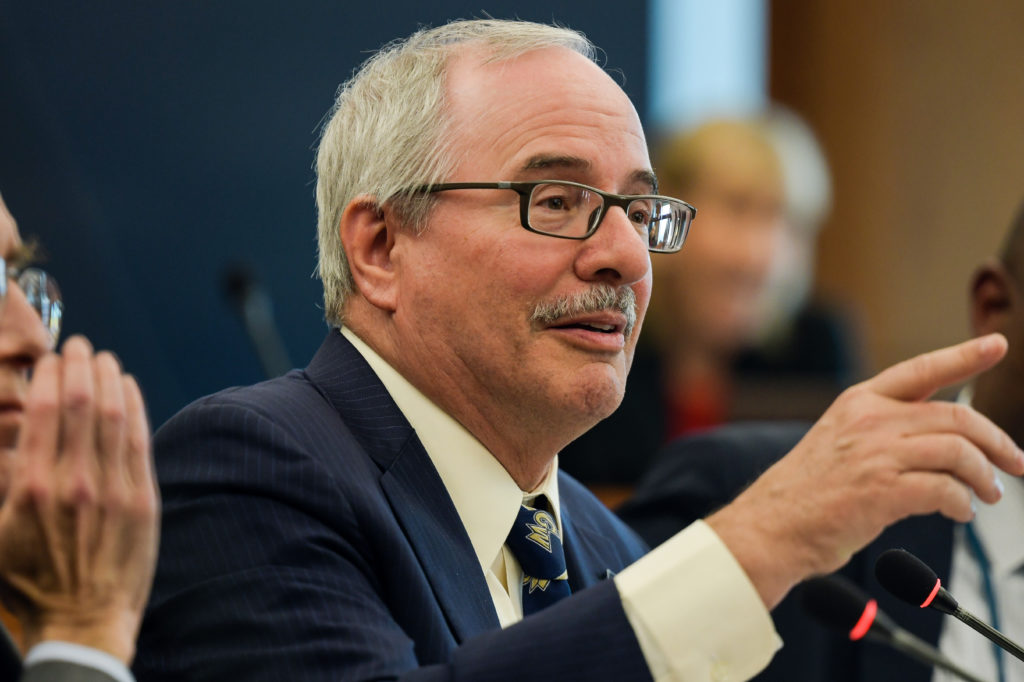High-profile alumni serving on the Leadership Advisory Council said they counseled top officials on major decisions like enrollment cuts in the group’s first year.
The council, launched in April, comprises 39 “distinguished” alumni invited by University President Thomas LeBlanc to advise top officials on decisions to “further GW’s efforts to achieve preeminence,” according to the council’s website. Officials said the alumni on the council are assisting University leaders in formulating strategies and making progress on top initiatives.
Patricia Carocci, the senior associate vice president of alumni relations and annual giving, said the council, previously named the “President’s Council,” is in its early stages and has met twice, once in April and once in November.
“During the meetings, the council participates in activities that showcase GW programs and provides insights from their professional life and personal GW experience to assist University leaders,” Carocci said in an email.
Carocci said the councilmembers “strengthen GW” by providing insights to top officials and serving as a “sounding board.” The members also benefit from networking with one another through their collaborative work, she said.
The councilmembers serve as founders and executives of major companies and organizations like the New York Yankees and The Metropolitan Museum of Art, according to the council’s website.
Jonathan Kahan, an alumnus who graduated with a bachelor’s degree in 1970 and a law degree in 1973 and is a partner at the law firm Hogan Lovells, said he has been “heavily involved” with advising top officials in his role on the president’s council and the GW Law School’s Dean’s Advisory Council. He said he joined the council to bring GW to the “highest level” of excellence by assisting LeBlanc in his priorities.
“I was extremely impressed at that time with how thoughtful he was, especially in regards to students – student spirit, student experience, all of those issues,” Kahan said. “I thought it would be a good opportunity to further those discussions.”
He said that at the council’s two meetings, LeBlanc led an open discussion about the major changes that he wanted to propose for the University, like reducing the undergraduate population by nearly 20 percent over five years.
Kahan said the council discussed the benefits of the reduction with officials, like easier registration and a higher likelihood that students would get their top choices for housing.
He added that no specific goals have been set for the coming year, but members of the council are keeping open lines of communication with one another.
Kahan said the council has helped involve alumni in GW’s operations and planning by including their perspective directly in decision-making, which could help boost fundraising levels. GW saw its third-best fundraising year on record in fiscal year 2019, but the University’s alumni giving rate has clocked in at the lowest among its 12 peer institutions for at least two consecutive years.
“It has connected a lot of alumni together,” he said. “It helps build loyalty and maybe it’ll also lead to alumni development and giving to the school.”
Amanda Antico, the founder of consulting firm EvolvED and an alumna who graduated with a bachelor’s degree in 1996 and a doctorate in education in 2000, said faculty and staff gave the council a guided tour of the Science and Engineering Hall at their most recent meeting Nov. 8. She said they were touring SEH, which opened nearly five years ago, to see the new building and likely to complement their discussions of LeBlanc’s plans to increase the proportion of STEM students from 19 to 30 percent over the next five years.
“He wanted those of us who had left campus many years ago to see the STEM building,” Antico said. “He just wants people to see campus and see what’s happening.”
She said officials plan to focus the council on advising the president on his five strategic initiatives, like philanthropy and constituent engagement and the student experience, and the four pillars of the next strategic plan, like faculty and undergraduate education.
“What I would guess is that at each session moving forward, we will focus on one or two of the pillars and how we can assist, guide or council one or two of those pillars,” Antico said.
She added that councilmembers can help officials look at difficult situations from “multiple perspectives” because they come from different backgrounds to assist officials in navigating “hard times.”
“The council is full of people who have done well and really care about where GW and the community is going,” Antico said.





